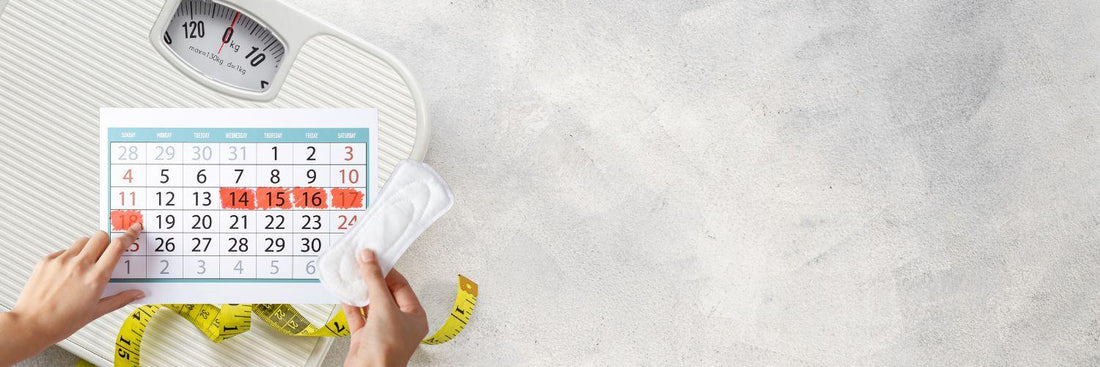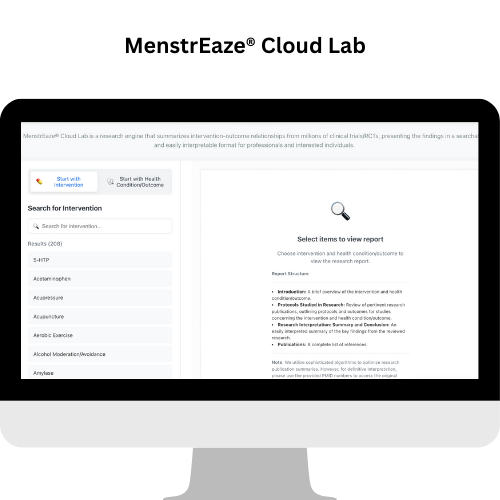Do your favorite jeans feel a bit snug around the time of your period? You're not alone! Many people report feeling bloated and like they've gained weight right before and during their period. While it can be frustrating, this is a very common experience. Studies have shown that it's normal to gain three to five pounds during this time, with the weight typically disappearing a few days after your period starts. One study even found that body weight was statistically significantly higher during menstruation compared to the first week of the menstrual cycle. It's important to remember that this weight fluctuation is primarily due to water retention and not actual fat gain.
To gather information for this blog post, we examined scientific studies and articles discussing weight fluctuations during the menstrual cycle. We also explored the hormonal changes that occur during the cycle and their potential impact on weight, as well as common causes of weight gain or bloating, such as water retention, changes in appetite, and food cravings. Finally, we investigated tips and strategies for managing weight fluctuations and the potential impact of specific menstrual cycle phases on metabolism and weight.
Hormonal Changes and Their Impact on Weight
Your menstrual cycle is controlled by hormones, primarily estrogen and progesterone. These hormones fluctuate throughout your cycle, and these fluctuations can cause various physical and emotional changes, including weight fluctuations.
Estrogen and Progesterone
Estrogen and progesterone can cause weight gain by increasing water retention. In the days before your period, progesterone levels drop rapidly, which signals to your body that it's time to begin menstruation. While estrogen levels also fall towards the end of the cycle, they actually rise during the first part of the follicular phase (after menstruation). When these hormones fluctuate, the tissues in your body can accumulate more water. This water retention may cause:
- Swelling or puffiness in your breasts, stomach, or extremities
- Bloating
- A temporary increase in weight
Bloating: More Than Just a Feeling
Bloating is a common symptom during your period, and it can be caused by a few different factors:
- Hormonal changes: As mentioned earlier, fluctuations in estrogen and progesterone can cause your body to retain water, leading to bloating, especially in the abdomen.
- Digestive issues: Hormonal changes can also slow down digestion, leading to constipation and increased gas in the gastrointestinal tract, which can also cause bloating.
- Specific foods: Certain foods, such as salty foods, caffeine, and sugar, can worsen bloating.
While bloating itself doesn't cause actual weight gain, it can make your clothes feel tighter and contribute to the feeling of being heavier.
Other Causes of Weight Gain During Your Period
In addition to hormonal changes and bloating, other factors can contribute to feeling like you've gained weight during your period:
- Changes in appetite: Progesterone can stimulate your appetite, while estrogen regulates serotonin, a neurotransmitter that affects mood and reduces appetite. When estrogen drops before your period, so does serotonin, leading to a bigger appetite and potential overeating.
- Food cravings: Low serotonin can also increase cravings for sugary foods because carbohydrates help the body produce serotonin. Giving in to these cravings can lead to increased calorie intake and temporary weight gain.
- Gastrointestinal issues: Hormonal fluctuations can cause gastrointestinal issues like constipation and diarrhea, which can contribute to bloating and make you feel heavier. Prostaglandins, chemicals released by your uterus to contract and shed its lining, can also cause stomach cramps and contribute to the sensation of weight gain.
- Decrease in magnesium: When your period begins, magnesium levels gradually decrease. This can cause dehydration, which can be mistaken for hunger and lead to overeating.
- Skipping workouts: If you're feeling tired or experiencing cramps, you might be less likely to exercise. This can contribute to weight gain.
Insulin Sensitivity and Your Cycle
Interestingly, research suggests that insulin sensitivity, or how your body responds to the hormone insulin, fluctuates throughout your menstrual cycle. Insulin regulates blood sugar and can affect hunger and cravings. Studies have shown that insulin sensitivity is highest during the follicular phase and lowest during the luteal phase, which is when cravings typically occur. This might explain why you feel hungrier and crave more carbohydrates before your period.
Functional Hypothalamic Amenorrhea (FHA)
It's also important to be aware of a condition called Functional Hypothalamic Amenorrhea (FHA), where individuals lose their periods due to insufficient energy intake. This can happen when someone is physically active, doesn't eat enough calories, and/or is under extreme stress. FHA highlights the crucial link between energy balance, weight, and menstrual health.
The Impact of Specific Menstrual Cycle Phases on Metabolism
Your metabolism fluctuates throughout your menstrual cycle. During the follicular phase, when estrogen is the dominant hormone, your metabolic rate is lower, and you may have more energy and recover faster from exercise. This is a great time to incorporate high-intensity workouts into your routine.
During the luteal phase, when progesterone levels are higher, your metabolic rate increases, and you may feel more tired. You might also experience increased fat burning during this phase, but this can make exercise feel harder. It's best to focus on lower-intensity cardio and strength training during this time.
Understanding how your metabolism changes throughout your cycle can help you adjust your diet and exercise routine to optimize your energy levels and manage weight fluctuations.
Tips for Managing Weight Fluctuations
While weight gain during your period is usually temporary, there are a few things you can do to manage it:
- Maintain a healthy diet: Eat plenty of fruits, vegetables, and whole grains. Limit your intake of salty foods, caffeine, and sugar, which can all contribute to bloating and water retention.
- Exercise regularly: Exercise can help reduce water retention and bloating, improve your mood, and boost your energy levels. Aim for at least 30 minutes of moderate-intensity exercise most days of the week.
- Stay hydrated: Drink plenty of water throughout your cycle to help flush out excess salt and reduce water retention.
- Manage stress: Stress can worsen PMS symptoms, including bloating and water retention. Try relaxation techniques like yoga or meditation.
- Consider supplements: Magnesium supplements may help reduce water retention and bloating.
- Talk to your doctor: If you're concerned about water retention, your doctor may prescribe diuretics or oral contraceptives to help alleviate this symptom. Always consult a healthcare professional before starting any new medication.
Track Your Cycle, Track Your Symptoms
One of the most helpful things you can do to manage weight fluctuations and other period-related symptoms is to track your menstrual cycle and any changes you experience. By tracking your cycle, you can start to identify patterns and potential triggers for weight fluctuations, cravings, and other symptoms. This can help you make proactive choices to manage your health and well-being throughout your cycle.
Conclusion
Weight gain is a common symptom before and during menstruation. It's primarily caused by hormonal fluctuations that lead to water retention and bloating. Other factors, such as changes in appetite, food cravings, decreased magnesium levels, and even prostaglandins, can also contribute to this temporary weight gain. Remember, this weight gain is usually temporary and is not actual fat gain.
By maintaining a healthy lifestyle, managing stress, and understanding the impact of your menstrual cycle on your metabolism, you can effectively manage weight fluctuations and minimize discomfort during your period.







